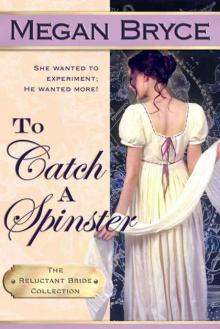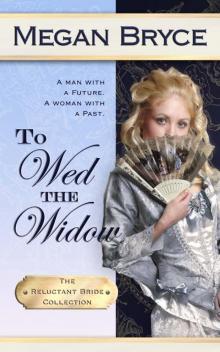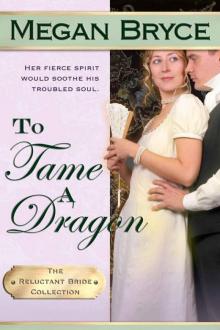- Home
- Megan Bryce
To Tempt the Saint Page 5
To Tempt the Saint Read online
Page 5
And Miss Twiggy wouldn’t be grateful for small, poisonous favors.
She said, “I don’t care a fig whether they welcome me or not. There is only one person I care to see and I want him to know that I am a free woman.”
“But will he welcome you, my dear? Miss Blackstock has been tarnished.”
“I must believe that he won’t care, Aunt. The real problem is running into him. Our circles do not overlap.”
“You mean his and Miss Blackstock’s circles do not overlap.”
That was what she meant. Honora Kempe might have been his equal but, “Since Miss Blackstock is how he knows me, that is who I must stay.”
“I would say he must know you very little. Did the matter of who your father is come up at all?”
Honora tried to remember. Had she ever mentioned her father? And if so, what had she told him?
Lies were so easy to confuse.
“If we can but find him, I can figure out what I told him about my father. And embellish, should I need to.”
“Perhaps Mr. St. Clair is not in Manchester.”
Perhaps. His note had given her very little information. Only that he was leaving London for Manchester, and offering her and Mr. Moffat a hearty “good luck”.
It had turned out to be harder than she’d expected to find one man in a town that was rapidly approaching 300,000.
Honora said, “Then we are here, in this dreary and hostile land, for nothing.”
Her aunt and uncle shared a glance over her head and Honora pretended not to see it.
Pretended not to see the conjecture in the men’s eyes and the contempt in the women’s.
It did not improve her mood to know that she deserved both, though not for the reason they assumed.
She knew she would not see the same in Mr. St. Clair’s. . .
She hoped she would not.
She had not a clue how to find him though. He was indeed out of Miss Blackstock’s circle and she could not go chasing after a man openly, not now. Could not ask about him, though she sent her uncle to try and find him.
Had she known that one day she would hunt Mr. St. Clair, she would have asked more direct questions of him.
“Letitia,” her aunt began, and Honora shook her head.
She could hear the defeat in their voices. Could hear the exhaustion, could hear that at some point this game had stopped being fun.
“We only need one more and then we are done for good.” Honora tipped her head up, resolved. “We’ll stay here until we know of somewhere else to look.”
Uncle Hubert said, “Just imagine, Gertrude. A small house on the edge of a small town. Enough money for warm rooms, fine clothes, good meat.”
“Good ale, I suspect as well.”
“If you must,” he said and made both women laugh.
Honora slipped her arms through theirs, one on either side of her. “Enough for books and the well wishes of our neighbors.”
“He’ll give that to us? All of it?”
“He will,” Honora said. “I know he will.”
If they could ever find the blasted man.
It was months before she did and she’d nearly given up on him.
Uncle Hubert and Aunt Gertrude had, and while they’d asked once if perhaps there wasn’t another gentleman in Manchester that might work in his stead, Honora had refused.
One more man. One more engagement.
She would save it for him.
And then one day, she found him the exact same way she’d found him in the first place.
At a lecture on the wonders of steam boilers.
She stopped stock still and stared at him and blinked wildly, wondering if perhaps Manchester and its rain and unwelcome society had made her go mad.
He rose and made his way to her, looking just as shocked as she, although perhaps less stupidly so.
“Why, Miss Twiggy. Or should I say Mrs. Twiggy?”
Honora opened her mouth and blinked some more.
“Miss Blackstock? Er, Mrs. Moffat? I now quite understand how irritating one could find a name change.”
Honora closed her mouth and stopped her incessant blinking and said scintillatingly, “Yes. Quite annoying.”
“It is. Yes.”
“. . .It is Miss Blackstock still.”
“Ah. And here I was imagining running into Mr. Moffat and seeing what wedded bliss had turned him into.”
He offered her the seat next to him and she sat wordlessly.
Just how, she wondered blankly, was one supposed to bring up the fact that Mr. Moffat was no longer?
She’d thought, months ago, that she could simply laugh and say he met Miss Twiggy and called off the wedding. But it had been too long, now.
After a long awkward moment, she simply said, “I’m sorry, Mr. St. Clair. You’ve surprised my wits away.”
“I have no doubt they will return with force, Miss Blackstock.”
“I do hope so,” she said with an embarrassing wobble.
She looked down at her leaflet, sitting next to him once again, and nearly cried out, I thought I had lost you. I thought I had missed my chance. And here you are.
He said, “Now, what are you doing in Manchester? Has it become fashionable?”
“Nooo.”
He chuckled. “I am relieved. I’m not sure I want to live in a world where Manchester is the place to go to be seen.”
The speaker began to make his way to the podium and Honora leaned toward Mr. St. Clair. She said softly, “Do you remember you said that if you’d never met Mr. Moffat, I would have still worked him into the conversation? To warn you that I was taken and off-limits.”
“I remember. You seemed to be quite insulted by the idea.”
“I think you were right. It would be so much simpler if there was a form of address for a woman who used to be engaged, but now is no longer.”
This time, it was he who sat there looking stupid and awkward and uncomfortable.
“Did he. . .pass?”
“No,” she said. “He met Miss Twiggy.”
Mr. St. Clair sucked in a breath and said softly, “Before the wedding.” And then, sharply, “He called it off?”
She nodded.
“A cad, I thought so from the very beginning. I am sorry, Miss Blackstock.”
Honora’s wits, at last, returned and she stuck her nose in the air to haughtily say, “I’m not.”
Honora did not go straight home. She couldn’t.
She simply couldn’t.
So she walked, her maid trailing farther and farther behind and unable to see the tears streaming down her mistress’s face.
It was the weather. It was Manchester. It was being unwelcome and unliked and pitied.
There was nothing worse than being pitied by those you yourself pitied. Those who were silly and blind and stupid.
Except, it was worse being pitied by someone you very nearly liked. Someone who, if one wasn’t going to swindle a nice and comfortable living from, one would actually enjoy being around. Someone who wasn’t silly or stupid, though probably still blind.
He had to be. He would be.
He would be worth the last few horrid months. He would be worth being Miss Letitia Blackstock for a little while longer.
And then, when it was over, when they were assured a warm and well-fed and free future, she would finally let Miss Honora Kempe out again.
And try and remember just who she was.
St. Clair smiled on the way home, remembering Miss Twiggy’s I’m not.
He stopped smiling when he remembered her shocked face and defeated posture when she’d first seen him. How could any honorable gentleman do that to a woman and force her to Manchester of all places?
No wonder they’d left London. A broken engagement was a spinster sentence, and George could very well imagine why Miss Blackstock had been so shocked to see him. Especially when the first thing out of his mouth was to ask about Mr. Moffat.
How could he have known?
He couldn’t have.
But that didn’t change the fact that he wished he had. That he wished he hadn’t said anything and could have remembered her as the ferocious Miss Twiggy for always.
He hoped it would return. Hoped she would return, next week.
That stopped him and he paused before going inside. Surely, Miss Twiggy could not be scared away. Surely, Miss Twiggy was in there still.
Licking her wounds, perhaps. But still there.
He pushed in the door to his little home, calling for Collin before shrugging off his coat.
The vicarage suited him, he’d been surprised to find. A new home, next to a new church built to accommodate the growing population on the outskirts of town.
The congregation was welcoming but that might have only been because he was young and there was an overabundance of unmarried young women in the vicinity.
A woman came in to cook and clean during the week and George had thought that he might hire a dedicated cook but the need had never arisen. Collin could make tea and boil an egg if needed, but since baskets of meat pies, savory stews, and freshly baked bread invariably found their way to his doorstep with a note inviting him to dinner, it was rarely necessary.
The women wanted to make sure that the bachelor vicar remained robust, and not a bachelor for very much longer.
He tried not to abuse their hospitality but it was his duty to get to know the members of his parish. And, because he was a man with limited experience in fawning women, he did enjoy a few dinners every week.
Collin came down the steep stairs lightly. “And how was the lecture?”
“You remember I told you about the steam woman in London?”
Collin paused. “Err, no.”
“The one at the steam lectures with the poor fiancé.”
“Oh, yes. The abrasive one.”
“She’s here! She was at the lecture. And sans the fiancé; a free woman, as it were.”
Collin resumed his descent, going straight to the coat George had just hung up to brush the dust from it. “That is a very strange coincidence that she turned up here, in Manchester.”
“Very strange. She nearly fell over in shock when she saw me.”
“And yet, still managed to let you know the fiancé was no more.”
“I did ask about him quite pointedly.”
“Hmm.”
“What?”
Collin pulled papers from the coat pockets and sorted through them. “Just, hmm.”
“She suffered a change of circumstance and wanted a fresh start.”
“And she chose Manchester.” Collin pointedly looked at him. “You’re the son of a lord. With a living. Need I remind you that you’re a catch?”
George snorted and shook his head and went to sit before the fire for awhile. To warm his toes and remember. London and a woman who’d shocked him senseless. An engaged woman he’d been overly familiar with because she was safe.
Taken.
And now she wasn’t.
He remembered a woman who had looked at him with a spark in her eye and said, In your case, I think the correct term would be hunting.
The next week he was late to the lecture and he’d rushed in to find Miss Blackstock already seated with an empty spot beside her. George sat down with a brief nod and a curt, “Are you hunting me?”
Miss Blackstock glanced at him. “We’ve already had this conversation. Please try to keep up.”
George tried not to find her amusing, really he tried. But she was. And he did.
“I see your wit has returned. Good for you. But during that conversation, you had a fiancé and now you don’t.”
“It’s true. I did, and I don’t. I. . .am not at all sure I would like to have another. You are safe with me, Mr. St. Clair.”
The lecturer took his spot and began speaking, and George leaned close to whisper in her ear, “I’d like to believe you. I would.”
She replied just as quietly, “And I am wondering why exactly you don’t.”
She moved, just a small shift, and her arm brushed his.
“Perhaps it’s your choice of wordage. I am safe with you but am I safe from you?”
“There is a distinction, isn’t there? Because I assume I am safe from you but with you. . . I should make my maid come in next time. She can sit between us.”
“Sounds horrible. I assume this maid is as loud as the last one.”
“It does seem like a reasonable assumption. Perhaps there is some assurance you can give me so we don’t need to go down that path. Perhaps you became married since London? I can’t tell by your address, and either I’ve become immune to your manners or else there is a woman working her magic behind the scenes.”
George couldn’t help his smile. “No wife. No fiancée. I can’t even assure you that I am not looking for one, either. It is a truth universally acknowledged that a single man in possession of a good living must be in want of a wife, no matter his feelings on the matter.”
She gasped, twisting to meet him eye to eye. “I knew it! I knew you’d trained for the cloth.”
Her triumph was palpable and loud, even though it was still whispered, and a gentleman two rows in front turned around to scowl at them.
George stared into Miss Blackstock’s eyes– brown, they were brown with green and gold flecks– and said, “You knew it because I am condescending and self-righteous.”
“Yes. Preach the word, be instant in season, out of season, reprove, rebuke, exhort. . . 2 Timothy 4:2,” she said, but there was a smile on her lips and a twinkle in her eye.
They lasted a long moment, facing each other and glorying in their own triumphs until Miss Blackstock pulled away from him. She sat back in her seat, turning her attention to the lecturer again and George watched, a twisty unfamiliar emotion swirling inside him.
Intrigue, perhaps.
Interest, definitely.
Because he wouldn’t mind at all if she was hunting him.
“I know nothing about her!”
George threw the letter he’d just received toward the fire. He’d been expecting it and therefore had saved it from the now customary fiery fate– only to find that his solicitor could not find any information on Miss Letitia Blackstock.
To be fair, George had given the man very little information to work with. Her name. Her former fiancé’s name. She lived with an aunt and uncle, and no George didn’t know their names.
Blackstock, he would imagine. Unless the aunt was the blood relation.
Names were so very trying, he was beginning to realize.
Collin watched George pace back and forth, back and forth, and repeated mildly, “You know nothing about her.”
He’d said that before, when he’d watched George pen his original letter to the solicitor, and George had replied, “I know. I want to find out more. Thus, the letter.”
“And why this sudden interest?”
“It’s not sudden. I’ve been telling you about her since Lon–”
“Then why this suddenly serious interest?”
“She asked if I was married. Not in so many words, of course. And don’t interrupt your employer.”
Collin had waved away George’s admonition with a satisfied nod. “She’s chasing you.”
“No. It’s not a chase. There’s a glimmer in her eye, there’s a flush to her skin, there’s a. . .brain. . .a will. . .a plan. It’s something more than a chase. She’s hunting me.”
Collin’s eyebrows had slammed together. “You sound positively happy about it.”
George had smiled. “I am. Yes.”
“And you know nothing about her.”
George had stopped smiling and said a word no vicar should even know.
He said that word again, today, and then said, “I don’t know nothing. I just don’t know enough. Yet.”
Collin ran a finger along the mantelpiece, checking the housemaid’s work. “I think I would like to know a little bit more about Miss Blackstock. Perhaps I will join you to
day at the lecture.”
“Because having one’s valet accompany you to a lecture is not strange at all.”
“Then perhaps I will go as your brother-in-law.”
George paused in his pacing and cocked his head. “Slightly less strange for the general population. Slightly more strange for me.”
Collin said, “That’s decided then.”
They had already arrived and found their seats before the thought occurred to George that this might have been a horrible idea.
“Collin, you will be quiet during the lecture. No chatting, no fidgeting, no snoring, no knitting.”
Collin raised an eyebrow. “I’ll do my best.”
“This was a horrible idea. What was I thinking? If you interrupt the lecture, I will be forced to replace you.”
“Try again, George. And try to remember that today I am your brother-in-law and not your valet.”
“I did remember. And don’t call me George.”
“Of course not. Sir.” Collin turned in his seat to get a better view of George and said, “Are you always so nervous to see her?”
“Nervous? I don’t want you interrupting the lecture. It has nothing to do with her.”
“Of course not. Sir.”
Collin’s eyes roamed toward the door and he jerked his chin at it. “Since I’ve only seen one other woman here and she must be older than my granny, this must be Miss Blackstock.”
George turned in his seat to find Miss Twiggy heading right for them and he rose as she approached.
“Miss Blackstock, may I introduce Mr. Collin Clarke, my brother-in-law. . .so to speak. Our siblings are married. His sister, my brother.”
“Mr. Clarke. Have you come to be entertained by the wonders of steam?”
“Not in the least,” Collin said and George said over him, “I’ve taken him under my wing.”
Miss Blackstock looked between them for a long minute, then sat and made herself comfortable.
When George and Collin had followed her example, she said, “He’s not going to interrupt the lecture, is he?”
Collin nearly fell out of his seat laughing and George tried mightily to ignore him.
“I’ve already warned him off knitting,” George said gruffly and when Miss Blackstock chuckled at his wit, he suddenly found it much easier to keep his attention focused on her.

_preview.jpg) To Tame A Lady (The Reluctant Bride Collection)
To Tame A Lady (The Reluctant Bride Collection) Boring Is The New Black (The Fashionista and The Geek Book 1)
Boring Is The New Black (The Fashionista and The Geek Book 1) It's Only Temporary - The Complete Collection
It's Only Temporary - The Complete Collection The Tie's The Limit (The Fashionista and The Geek Book 2)
The Tie's The Limit (The Fashionista and The Geek Book 2) The Reluctant Bride Collection - The Complete Box Set
The Reluctant Bride Collection - The Complete Box Set Some Like It Charming (A Temporary Engagement)
Some Like It Charming (A Temporary Engagement) To Catch A Spinster (The Reluctant Bride Collection)
To Catch A Spinster (The Reluctant Bride Collection) Boring Is The New Black
Boring Is The New Black To Wed The Widow
To Wed The Widow To Tame a Dragon
To Tame a Dragon To Tempt the Saint
To Tempt the Saint The Reluctant Bride Collection
The Reluctant Bride Collection The Tie's The Limit
The Tie's The Limit Some Like It Hopeless (A Temporary Engagement)
Some Like It Hopeless (A Temporary Engagement)